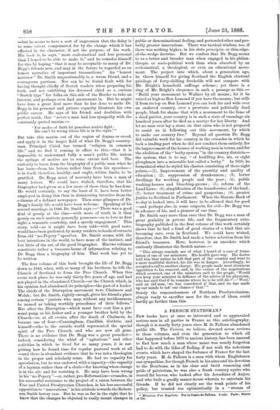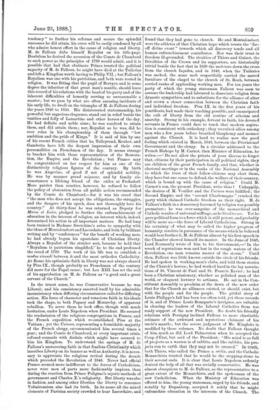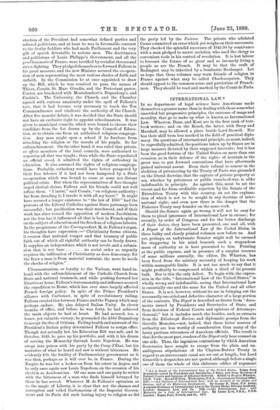A FRENCH STATESMAN.*
FEW books have at once so interested and so aggravated serious men in all parties in France as this autobiography, though it is nearly forty years since M. de Falloux abandoned public life. The Univers, we believe, devoted seven reviews to these volumes, and even the generation to which all that happened before 1870 is ancient history, has been amazed to find how much a man whose name was nearly forgotten had to do with the tides of feeling, if not with the notorions events, which have shaped the fortunes of France for the last forty years. M. de Falloux is a man with whom Englishmen can sympathise, for though French in his aims and his devotion to the Bourbons, as in his clear and lucid reasoning and pride of patriotism, he was also a frank country squire who reared fat beeves, who looked after his Arcadians of Anjou, and who built a goodly manor-house wherein to entertain his friends. If he did not clearly see the weak points of his policy, but trusted too optimistically in a "stream of • Memoirea (run Royaliste. Par le Comte de Falloux, 2 sob. Paris : Perrin at Cie.
tendency" to further his reforms and secure the splendid successes he did attain, his error will be easily condoned by all who admire honest effort in the cause of religion and liberty. M. de Falloux dubs himself Royalist on his title-page. Doubtless he desired the accession of the Comte de Chambord to such power as the principles of 1789 would admit, and it is possible that had that obstinate Prince trusted the political sagacity of M. de Falloux, he might have died at the Tuileries and left a Kingdom worth having to Philip VII.; but Falloux's Royalism was one with his patriotism, and both were rooted in religion. It was fitting that the pupil of Berryer, and in some degree the inheritor of that great man's mantle, should leave this record of his relations with the head of his party and of the inherent difficulties of honestly serving so unreasonable a master; but we pass by what are often amusing incidents of his early life, to dwell on the triumphs of M. de Fallon' during the years 1848 to 1850. His disinterested statesmanship, his powerful but sagacious eloquence, stand out in relief beside the vanities and folly of Lamartine and other heroes of the day. He had definite and noble aims ; he was resolved to attain them, and did attain them ; nor, Royalist as he was, did he ever relax in his championship of them through "low ambition and the pride of Kings." It is said of him by one of his recent French critics that he, Talleyrand, Rouher, and Gambetta have left the deepest impression of their own personalities on Frenchmen of the day. It seems strange to bracket him with those representatives of the Restora- tion, the Empire, and the Revolution ; but France may be congratulated on her respect for him as one of the distinctively religious figures of the century. By birth he was Angevine, of good if not of splendid nobility. He was by manner grand seigneur, and by family cir- cumstances a lifelong friend of the exiles at Frohsdorf. More patriot than courtier, however, he refused to follow the policy of abstention from all public action recommended by the Comte de Chambord,—f or it was his creed that "the man who does not accept the obligations, the struggles, and the dangers of his epoch, does not thoroughly love his country." At thirty-four he was returned as Deputy for Maine et Loire, pledged to further the enfranchisement of education in the interest of religion, an interest which, indeed, determined his action in all important matters. He had long been trained in Madame Swetchine's salon to sympathy with the ideas of Montalembert and Lacordaire, and both by brilliant writing and by " conferences " for the benefit of working men, he had already begun his apostolate of Christian liberty. Always a Royalist of the straiter sect, because he held that "Royalism is patriotism simplified," he to the end professed the creed of 1789. The work of his life was to establish a ntodus vivendi between it and the most orthodox Catholicity. At Rome his optimistic faith in liberty was not always shared by Pius IX., though probably no Frenchman of the century did more for the Papal cause ; but Leo XIII. has set the seal of his approbation on M. de Falloux as "a good and a great servant of the Church."
In the truest sense, he was Conservative because he was Liberal ; and his consistency asserted itself by his admirable inconsistency when differing circumstances called for differing action. His force of character and tenacious faith in his ideals took the shape, to both Papacy and Monarchy, of apparent rebellion. To serve them he took office, though with much hesitation, under Louis Napoleon when President. He secured the readmission of the religious congregations in France, and the French expedition which re-established Pius at the Vatican ; yet the Univers, representing a formidable majority of the French clergy, excommunicated him several times a year; and the Comte de Chambord, at every important crisis, refused counsels with disdain which might have secured to him his Kingdom. To understand the springs of M. de Falloux's unwavering faith in that fearless Christianity which inscribes Liberty on its banner as well as Authority, it is neces- sary to appreciate the religious revival during the decade which preceded the Revolution of 1848. Never had official France seemed more indifferent to the forces of Catholicism, never were men of parts more fashionably impious, than during the reaction from Prince Polignac's mystic methods of government and Charles X.'s religiosity. But liberty was also in fashion, and among other liberties the liberty to renounce Voltaireanism also had its birth. In its name all the mixed elements of Parisian society crowded to hear Lacordaire, and found that they had gone to church. He and Montalembert were the athletes of that Christian hope which trusts the "far- off divine event" towards which all discovery tends and all human enfranchisement contributes. Nor was their trust in freedom ill-grounded. The rivalries of Thiers and Guizot, the frivolities of the Crown and its supporters, are historically trivial beside the fact that in 1830 the mob tore down the cross from the church façades, and in 1848, when the Tuileries was sacked, the same mob respectfully carried the sacred furniture of the chapel to the church of St. Roch, between serried ranks of applauding working men. For ten years the party of which the young statesman Falloux was soon to assume the leadership had laboured to dissociate religion from dynastic sympathies, and to substitute for the alliance of altar and crown a closer connection between the Christian faith and individual freedom. Pius IX. in the first years of his pontificate, had made their teaching possible, and emancipated the cult of liberty from the old routine of atheism and anarchy. Strong in his example, fervent in faith, his devoted servants in France could dare to teach that modern aspira- tion is consistent with orthodoxy ; they recruited allies among men who a few years before breathed blasphemy and menace against the Church. It is hard to realise now the good feeling which existed in March, 1848, between the Provisional Government and the clergy. In a circular addressed to the French Bishops by M. Carnot, then Minister of Education, he writes :—" Do not allow the priests of your diocese to forgel. that, citizens by their participation in all political rights, they are children of the great French family, and that, whether in electoral meetings or in the ranks of the National Assembly to which the trust of their fellow-citizens may elect them, they have but one cause to defend, the welfare of their country, which is bound up with the cause of religion." Could M. Carnot's son, the present President, write thus ? Unhappily, the desires of M. Veuillot and the Univers were fulfilled ; the Second Empire and the "second Charlemagne" crushed the party which claimed Catholic freedom as their right. M. de Falloux's faith in a democracy leavened by religion was possibly premature ; he was over-sanguine of the monarchical and Catholic results of universal suffrage, as he lived to see. Yet he gave political form to a force which is still potent, and probably will be more so,—the force of Liberal Catholicism. Strong in his certainty of what may be called the higher progress of humanity, resolute in pursuance of the means which he believed would best further it, M. de Falloux almost by his first speech in the Chamber showed himself its master. In the June of 1848, Lord Normanby wrote of him to his Government,—" In the wreck of reputations won and lost in the rough waters of the Revolution, one man remains master of the storm." Until then, Falloux was little known outside the circle of his friends.. He had spoken in working-men's clubs, and told them stories of the Church's heroes ; he had worked hard in the lay associa- tions of St. Vincent de Paul and St. Francis Xavier ; he had been a Christian missionary, whether as polished man of the world, or eloquent lecturer to artisans. He sat in the Con- stituent Assembly to proclaim at the dawn of the new order that for the Church no alliances existed, or should exist, but. with the people and for the people. The pitiful story of Louis Philippe's fall has been too often told, yet these records. of it, and of Prince Louis Bonaparte's intrigues, are valuable in clearing the leaders of the Liberal Catholics from too- ready support of the new President. No doubt his friendly relations with Persigny inclined Falloux to more charitable estimate of the awkward and mysterious claimant of his. uncle's mantle ; but the severe judgment of Mr. Kinglake is modified by these volumes. No doubt that Falloux thought of him much as did Lord Palmerston when he accepted the Coup d'Etat, but said of the President : "Hie mind is as full of projects as a warren is of rabbits, and like rabbits, his pro- jects run to earth that they may not be crossed," In truth, both Thiers, who called the Prince a erain, and the Catholic Monarchists trusted that he would be the stepping-stone to. their several ends. It is clear that Louis Napoleon ardently desired the help of all that was socially conservative. He was almost obsequious to M. de Falloux, as the representative to a great extent of the Monarchists, and the spokesman of the new Catholicism. When the Ministry of Education was offered to him, the young statesman, urged by his friends, and notably by Dupanloup, accepted it solely that he might enfranchise education in the interests of the Church. The election of the President had somewhat defined parties and sobered politicians, and at least he was in favourable contrast to the frothy faddists who had made Parliament and the very gift of speech detestable to serious men. The doctrinaires -and politicians of Louis Philippe's Government, and all the prud'hommerie of France, were terrified by socialist threats and street-fighting. They pledged themselves to forward Falloux in his great measure, and the new Minister secured the co-opera- tion of men representing the most various shades of faith and unfaith. In the Commission he at once appointed to draw up the Bill, which he was resolved to pass, the names of Thiers, Cousin, St. Marc Giradin, and the Protestant pastor, Cuvier, are bracketed with Montalembert's, Dupanloup's, and Cochin's. The University, the Church, and the Chamber agreed with curious unanimity under the spell of Fallour's tact, that it had become very necessary to teach the Ten Commandments and vindicate the authority of the Church. After five months' debate, it was decided that the State should not have an exclusive right to appoint schoolmasters. It was given to municipal councils, which were bound to choose their candidate from the list drawn up by the Council of Educa- tion, or to obtain one from an authorised religious congrega- tion. Any man might open a school if he forebore from attacking the religion or the morals of his pupils. So far enfranchisement. On the other hand, it was ruled that priests, ex officio members of the- local councils, were authorised to supervise all that was taught; thus, while the State repudiated an official creed, it admitted the rights of orthodoxy in 'education. It also assumed the rights of religious congrega- tions. Probably, orthodoxy would have better prospered by their free labours if it had not been hampered by a State co-operation which was bound to cease at some not distant political crisis. But when the representatives of free-thought urged clerical claims, Falloux and his friends could not well refuse them. "I insist," said Cousin, "on religious authority ; far from dreading it, I invoke it with all my heart." It might have secured a longer existence to "the law of 1850" had the protests of the Liberal Catholics against State patronage been successful ; but pacification was their watchword, and if their work has since roused the opposition of modern Jacobinism, not the less has it influenced all that is best in French opinion on the subject of education and the freedom of religious labours. In the programme of the Carrespondant, M. de Falloux's organ, his thoughts have expression :—" Christianity forms citizens, it creates that national temper and that treasury of public faith out of which all rightful authority can be freely drawn. It supplies an independence which is not revolt, and a submis-
sion that is not base no social order so urgently requires the infiltration of Christianity as does democracy, for the freer a man is from material restraint, the more he needs the checks of religion." .
Ultramontanism, or loyalty to the Vatican, went hand-in- hand with the enfranchisement of the Catholic Church from State and national trammels, and while pushing forward her liberties at home, Fallonx's statesmanship and influence secured the expedition to Rome, which has ever since largely affected French foreign policy. In spite of the Prince President's alliance with Carbonari, in spite of revolutionary railing, Fallon' created ties between France and the Papacy which may perhaps endure. He also delayed Italian Unity. In eleven months of office, and before he was forty, he had achieved the main objects he had at heart. He had secured, too, a lesser, yet valuable victory; he persuaded the Abbe Dupanloup to accept the See of Orleans. Failing health and mistrust of the President's Italian policy determined Falloux to resign office. Though not actually law, his Education Bill was safe, and in October, 1849, he gave up his portfolio, and with it his dream of serving the Monarchy through Louis Napoleon. He was swept into prison with his party by the Coup d'Etat, but his narrative of what he heard and saw is without bitterness. He evidently felt the futility of Parliamentary government as it was then, perhaps as it will ever be, in France. During the Empire he was but a looker-on from his estate in Anjou, and he only once again saw Louis Napoleon, on the occasion of his election as Academician. Of one man and one party he writes with the bitterness of a man who finds himself betrayed by those he has served. Whatever M. de Falloux's optimism as to the magic of Liberty, it is clear that not the shames and corruption and veiled Carbonarism of the Imperial Govern- ment and its Paris did such lasting injury to religion as did the party led by the Univers. The priests who adulated Cnsar committed an error which yet weighs on their successors. They checked the splendid successes of 1845-50 by connivance with a man pledged to secret societies, who used the clergy as convenient tools in his control of revolution. It is lost labour to forecast the future of so great and so intensely living a people as are the French. It may be that the craft of Badinguet may be inherited by a bombastic Boulanger. Let us hope that these volumes may warn friends of religion in France against what may be called Charlemagnism. They should appeal to the common-sense and patriotism of French- men. They should be read and marked by the Count de Paris.








































 Previous page
Previous page